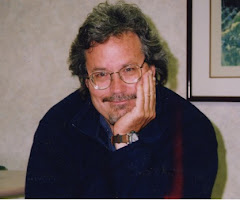I have failed in resisting the temptation to give you a long drink of McCarthy. Blood Meridian is about a young kid, running away from a hopeless home in Tennessee at age 14, who then drinks deeply of the dusty West, and the reader is given an alternate taste of what a wild, bitter, murderous place it was. Here is a conversation between the kid and Tobin, an ex-priest both of whom have caught on with a band of coup-counters, so to speak. They speak of The Judge, a fallen Renaissance Man who leads them. A taste, then:
You've done this afore, said Tobin.
The kid wiped hisnose with a swipe of his greasy sleeve and turned the piece in his lap. Not me, he said.
Well you've the knack. More so than me. There's little equity in the Lord's gifts.
The kid looked up at him and then bent to his work again.
That's so, said the expriest. Look around you. Study the judge.
I done studied him.
Mayhaps he aint to your liking, fair enough. But the man's a hand at anything. I've never seen him turn to a task but what he didn't prove clever at it.
The kid drove the greased thread through the leather and hauled it taut.
He speaks dutch, said the expriest.
Dutch?
Ay.
The kid looked at the expriest, he bent to his mending.
He does for I heard him do it. We cut a parcel of crazy pilgrims down off the Llano and the old man in the lead of them he spoke right up in dutch like we were all of us in dutchland and the judge give him right back. Glanton [the other leader of the gang] come near fallin off his horse. We none of us knew him to speak it. Asked where he'd learned it you know what he said?
What did he say.
Said off a dutchman.
The expriest spat. I couldnt of learned it off ten dutchmen. What about you?
The kid shook his head.
No, said Tobin. The gifts of the Almighty are weighed and parceled out in a scale peculiar to himself. It's no fair accountin and I dont doubt what he'd be the first to admit it and you put the query to him boldface.
Who?
The Almighty, the Almighty. The expriest shook his head. He glanced across the fire toward the judge. That great hairless thing. You wouldnt think to look at him that he could outdance the devil himself now would ye? God the man is a dancer, you'll not take that away from him. And fiddle. He's the greatest fiddler I ever heard and that's an end on it. The greatest. He can cut a trail, shoot a rifle, ride a horse, track a deer. He's been all over the world. Him and the governor they sat up till breakfast and it was Paris this and London that in five languages, you'd have give something to of heard them...
The expriest shook his head. Oh it may be the Lord's way of showin how little store he sets by the learned. Whatever could it mean to one who knows all? He's an uncommon love for the common man and godly wisdom resides in the least of things so that it may well be that the voice of the Almighty speaks most profoundly in such beings as lives in silence themselves.
He watched the kid.
For let it go how it will, he said. God speaks in the least of creatures.
The kid thought him to mean birds or things that crawl but the expriest, watching, his head slightly cocked, said, No man is give leave of that voice.
The kid spat in the fire and bent to his work.
I aint heard no voice, he said.
When it stops, said Tobin, you'll know you've heard it all your life.
Is that right?
Aye.
The kid turned the leather in his lap. The expriest watched him.
At night, said Tobin, when the horses are grazing and the company is asleep, who hears them grazing?
Dont nobody hear them if they're asleep.
Aye. and if they cease their grazing who is it that wakes?
Every man.
Aye, said the expriest. Every man..
McCarthy's prose is not for the faint of heart. In the end, his are not stories of hope but related tales of experience. You have to be willing to accept what he wants to say, and enjoy his saying it. In the end, it is the purity of his prose that is what is remembered and enjoyed.


3 comments:
Yes. I have to read Blood Meridian.
For what it's worth, I liked the ending of No Country, especially the way Tommy Lee Jones delivered it in the movie. I liked the ending of Cities, too, but I'll admit it could be a little off putting.
What Tommy Lee delivered and what McCarthy wrote were different: the Lee monologue was very good, but highly edited and abridged.
Not sure I ended up liking it either way. The Coen Bros. rendering seemed to miss the main point of the story, and tried to make up for that with a long dream sequence at the end. McCarthy just went on a lot longer than I thought necessary or helpful, to the point where I remember thinking, "Ok, Cormac. Easy does it, big guy. Let's not spoil a really really good tale here!"
Yeah, I really thought that. Well, I may not have called him by his first name. I'm sure I thought "Sir."
haha. I know what you mean. Cormac does have a tendency towards being overlong; it came out in other parts of the Border Trilogy, as well.
I thought the Brothers captured the spirit of the book pretty well, even if they shifted the emphasis from Sheriff Bell to Chigurh.
Post a Comment